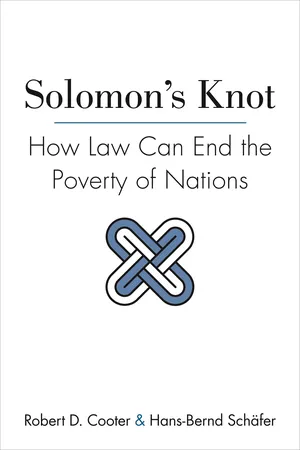
Solomon's Knot
How Law Can End the Poverty of Nations
- 344 pages
- English
- ePUB (mobile friendly)
- Available on iOS & Android
About this book
Why law is critical to innovation and economic growth
Sustained growth depends on innovation, whether it's cutting-edge software from Silicon Valley, an improved assembly line in Sichuan, or a new export market for Swaziland's leather. Developing a new idea requires money, which poses a problem of trust. The innovator must trust the investor with his idea and the investor must trust the innovator with her money. Robert Cooter and Hans-Bernd Schäfer call this the "double trust dilemma of development." Nowhere is this problem more acute than in poorer nations, where the failure to solve it results in stagnant economies.
In Solomon's Knot, Cooter and Schäfer propose a legal theory of economic growth that details how effective property, contract, and business laws help to unite capital and ideas. They also demonstrate why ineffective private and business laws are the root cause of the poverty of nations in today's world. Without the legal institutions that allow innovation and entrepreneurship to thrive, other attempts to spur economic growth are destined to fail.
Frequently asked questions
- Essential is ideal for learners and professionals who enjoy exploring a wide range of subjects. Access the Essential Library with 800,000+ trusted titles and best-sellers across business, personal growth, and the humanities. Includes unlimited reading time and Standard Read Aloud voice.
- Complete: Perfect for advanced learners and researchers needing full, unrestricted access. Unlock 1.4M+ books across hundreds of subjects, including academic and specialized titles. The Complete Plan also includes advanced features like Premium Read Aloud and Research Assistant.
Please note we cannot support devices running on iOS 13 and Android 7 or earlier. Learn more about using the app.
Information
Table of contents
- Cover
- Title Page
- Copyright
- Dedication
- Contents
- Preface
- Acknowledgments
- Chapter 1 It’s about the Economy
- Chapter 2 The Economic Future of the World
- Chapter 3 The Double Trust Dilemma of Development
- Chapter 4 Make or Take
- Chapter 5 The Property Principle for Innovation
- Chapter 6 Keeping What You Make—Property Law
- Chapter 7 Doing What You Say—Contracts
- Chapter 8 Giving Credit to Credit—Finance and Banking
- Chapter 9 Financing Secrets—Corporations
- Chapter 10 Hold or Fold—Financial Distress
- Chapter 11 Termites in the Foundation—Corruption
- Chapter 12 Poverty Is Dangerous—Accidents and Liability
- Chapter 13 Academic Scribblers and Defunct Economics
- Chapter 14 How the Many Overcome the Few
- Chapter 15 Legalize Freedom—Conclusion
- Notes
- Bibliography
- Index